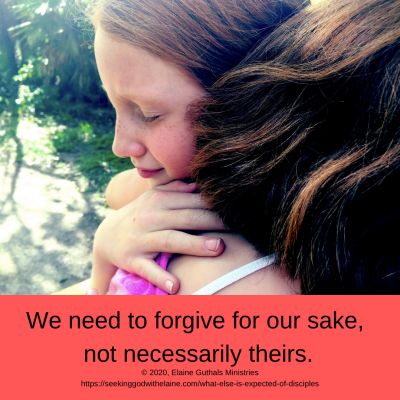When interacting with others, we are to show them the character of God. This devotion concludes our look at what is expected of disciples to do that.
Nuggets
- Meekness is a personality trait exhibiting a mild or moderate disposition that places dependence on God.
- We’ve got to stand firm patiently.
- We not only give up the right to retaliate, but we also initiate the forgiveness.
- Compassion, kindness, humility, gentleness, patience, forbearance, and forgiveness all filter up into love.

We started in the last devotion to look at what is expected of disciples from God and from the world. We talked about
- God chose mankind to whom to show His love.
- He has special blessings set aside for those who admit their sins, believe in Jesus as their Savior and Redeemer, and confess Him as Sovereign Lord.
- God expects us to have a heartfelt sympathy for others.
- Love is expressed through kindness – kindness is the action.
- Humility means we have a real perspective about ourselves.
Let’s see what else we can add to our list.
Let's Put It into Context
We are going to use the following definition from the Merriam-Webster Dictionary for social. It is defined as “of or relating to human society, the interaction of the individual and the group, or the welfare of human beings as members of society.”
Resource
Gentleness
“Therefore, as God’s chosen ones, holy and dearly loved, put on compassion, kindness, humility, gentleness, and patience, bearing with one another and forgiving one another if anyone has a grievance against another. Just as the Lord has forgiven you, so you are also to forgive” (Col. 3: 12-13 CSB)
The word is translated gentleness here. In some cases, it is translated meekness. We’ve talked about that before.
To read a related devotion, click the button below.
Meekness is “a personality trait of gentleness and humility, the opposite of which is pride. Meekness does not refer to weakness or passivity but to controlled power.”
Resource
So, in order to find out what meekness is, we need to find out what humility (which we just talked about in the last devotion) and gentleness are. Of course, gentleness sends us to gentle.
• Humility is a character trait that diminishes pride and places dependence on God while holding a modest view of our importance with respect to others.
• Gentle is “free from harshness, sternness, or violence.”
Resource
Hmmm. Don’t you love when they tell you what something is by only telling you what it isn’t?
We have to look to Daille to tell us that. He wrote that gentleness “… receives every one with an open heart and pleasing countenance, takes things in good part, and is proof against self-injurious irritations.”
Resource
So, I see someone who is gentle as having a mild or moderate disposition that doesn’t show favoritism. They don’t have the big mood swings from one extreme to another.
That would make meekness a personality trait exhibiting a mild or moderate disposition that places dependence on God.
The mild disposition is characterized by not taking offense (Barlow). This touches on self-control in the trials (Horton).
Resources
Hamilton suggested that, all wrapped up in meekness, is a self-evaluation component. He wrote, “It is the disciple praying and watching for the improvement of his talents, the mellowing of his temper, and the amelioration of his character.” We learn to detest our sinful nature and seek to imitate Jesus.
Resources
Glossary
Patience
We talked about patience in Patience as a Virtue. It is a steadfast endurance in opposition without losing a positive attitude. Patience is also translated as longsuffering.
To read a related devotion, click the appropriate button below.
Maclaren provides the distinction between patience and longsuffering. He wrote, “[Patience] is the temper which accepts God’s dealings, or evil inflicted by men without resistance, and its opposite is rudeness or harshness; [longsuffering] the long holding out before giving way to a temptation to an action or passion, and its opposite is swift resentment. While long-suffering floes not get angry soon, meekness does not get angry at all.”
Resource
Do you see how it builds on the meekness? Byfield showed how that plays out in real life.
• We follow God’s opinions, not our own.
• We don’t argue — if we answer at all.
• We don’t pay back evil with evil.
Resource
Have you ever had a worldview person try to test your patience on something? I have. It is hard. It is frustrating.
We’ve got to stand firm patiently. God gave me this passage today.
“Here is my servant whom I have chosen, my beloved in whom I delight; I will put my Spirit on him, and he will proclaim justice to the nations. He will not argue or shout, and no one will hear his voice in the streets. He will not break a bruised reed, and he will not put out a smoldering wick, until he has led justice to victory. The nations will put their hope in his name” (Mt. 12: 18-21 CSB emphasis added).
We’ve got to put our faith and trust in God, Whom we serve.

Forbearance and Forgiveness
We tried looking at forbearance before. That was how we got to longsuffering last time.
With it tied to patience last time, I found it interesting that, in this passage, it was tied to forgiveness.
Maclaren made an interesting observation. He wrote, “Forbearing and forgiving are meekness and long-suffering in exercise. A man may forbear and bite his lips till the blood come rather than speak unkindly, but forgiveness is an entire wiping of enmity and irritation out of the heart.”
Resource
Barlow takes forgiveness a step further. He instructed that we shouldn’t participate in the quarrel in the first place.
Resource
E.T.E.B. took forbearance a level up, though. It was written that forbearance is not only forgiving another, but it is also going the extra distance to meet them halfway.
Resource
Ooo, baby. Doesn’t E.T.E.B. know how hard it is to forgive someone in the first place?
Just think about it. We not only give up the right to retaliate, but we also initiate the forgiveness. Plus, we give up the hurt feelings.
No, unfortunately, relationships aren’t always going to be put back together after forgiveness is given. In instances of abuse and manipulation, forgiveness isn’t going to make that go away.
We need to forgive for our sake, not necessarily theirs.

Above All
“Above all, put on love, which is the perfect bond of unity. And let the peace of Christ, to which you were also called in one body, rule your hearts. And be thankful” (Col. 3: 14-15 CSB)
Does love sum it up or is it an overarching element? Either way, compassion, kindness, humility, gentleness, patience, forbearance, and forgiveness all filter up into love.
Sometimes the word is translated as charity. Charity means showing others love flavored with acts of benevolence.
Devotions in the What Is Charity? series
Charity is also identified as a grace. Tuck noted that “Charity covers the whole life and relationships of the Christian …”
Resource
Why can’t everyone just love everyone else? Sin bashed that. Sin is actions by humans that disobey God and break one of His laws and commandments, goes against a purpose He has for us, or follows Satan’s promptings.
Horton questioned the use of “… put on …” (Coll 3: 14 CSB). This isn’t a slip-your-head-and-arms-through-and-smooth-it-down type of deal.
This is one of the character changes that we have to make. No matter how loving we are, we have to change to imitate God’s loving. That means we have to get to heart level.
To read a related devotion, click the button below.
Glossary
Yes, the world loves differently than Jesus does. The worldview people have confused tolerance with love. Disciples are to tolerate their sins to show that we love them.
Let’s look at it this way. Let’s take Tom.
Tom and I are sitting at the airport waiting for our planes to take off. Someone comes and shoots Tom.
Even though Tom and I don’t know each other, I bet it would be a safe bet that Tom would want me to love him enough to call an ambulance. At the screaming outside, Tom would be grateful if I bundled him up and took him to the hospital.
I believe Tom has not ABCDed. I know that one day, if he hasn’t, Tom is going to stand before God at judgment day. God is going to look at Jesus, who will say, “Don’t look at Me. He’s not one of mine.” And Tom will be sentenced to an eternity in the fury of hell.
The ABCDs of Salvation
If you have not become a believer in Christ, please read through the
Plan of Salvation and prayerfully consider what God is asking you to do.
A – admit our sins
B – believe His Son Jesus is our Redeemer
C – confess God as Sovereign Lord
D – demonstrate that commitment by making any changes needed in our lives to
live the way in which God has called us
The Disciple’s Job Description
To read a devotion in the Hell Does Have Fury series, click on the appropriate button below.
But worldview people don’t want disciples to love them enough to warn them about their future.
Making the Connections
Thomas perfectly described what meekness is. One of the things he said was it was “… boldness with humility …” In reality, that is what being a disciple is.
Resource
Some think disciples have to be doormats. That isn’t true. God knows we will encounter spiritual warfare — especially as we do more for Him.
Making the Connections to Self-Discipline
We’ve been looking at defending our beliefs when we are witnessing. That means we have to be secure enough to convince someone to accept our beliefs.
Our questions should still serve us to determine on what we need to focus.
- What does the Scriptures say?
- What do I believe?
- Why do I believe the same/differently than the Scriptures?
- What are the talking points when witnessing to a non-believer?
Related Links
I have created a worksheet of the questions above. Click on the button below to access it.
How Do We Apply This?
I know. Every characteristic seems tied to the next. Yet, Barlow wrote, “The unity of Christian character is made up of many separate essential graces.”
What that is telling me is that we have to work on them as a package deal.
Oh, yes. I am a I’ll-work-on-this-first-and-that-next type of girl. That isn’t what I am reading here.
So, let’s dig a moment.
What we are doing is navigating the sanctification road so that we will imitate Jesus and grow into the character of God. Sanctification is the transformation of mind, body, and soul beginning with regeneration and ending with perfected state of spiritual wholeness or completeness. Regeneration is the change in us that God brings about when we go from being spiritually dead to spiritually alive.
The end goal is being perfected. The perfected state indicates spiritual wholeness or completeness. Christian perfection is achieving the two greatest commandments.
Glossary
So, we should run everything we do through the greatest commandments. Is what we are going to say going to keep those commandments or break them? Does our attitudes foster patience, forbearance, gentleness, etc.? If we don’t love, we don’t have the right attitudes.
Father. We want to love Your those You have made in Your image. We can do that through compassion, kindness, humility, gentleness, patience, forbearance, and forgiveness. It is our hope that they see You when they look at us. Amen.
What do you think?
Leave me a comment below (about this or anything else) or head over to my Facebook group for some interactive discussion.
If you don’t understand something and would like further clarification, please contact me.
If you have not signed up for the email daily or weekly providing the link to the devotions and the newsletter, do so below.
If God has used this devotion to speak with you, consider sharing it on social media.
Pingback: How Can We Heal This Land? – Seeking God with Elaine
Pingback: What Is Expected of Disciples? – Seeking God with Elaine
Pingback: The Prophecy of a Meek Savior – Seeking God with Elaine
Pingback: Peace and Safety Are the Rewards for Morality – Seeking God with Elaine